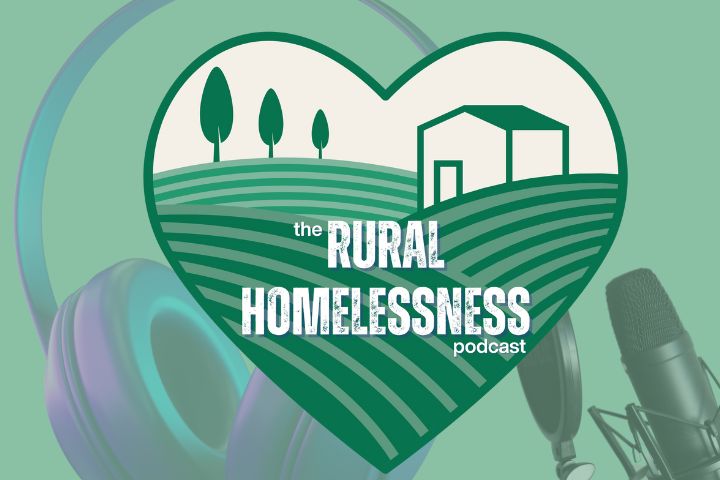➤
Back to News
13 October 2024
The Impact of Mental Health on Rural Homelessness
In this episode of the Rural Homelessness Podcast, Matt McChlery discusses the topic of mental health and its impact on people who have experienced rural homelessness. He interviews Marianne Watson, the Integrated Neighbourhood Program Manager for the Fenland Locality for the NHS, and Coryn Price, an NHS Community Psychiatric Nurse. They discuss the high prevalence of mental health conditions among homeless individuals, the challenges of accessing mental health services in rural areas, and the need for innovative solutions such as mobile outreach services.
Transcript
Introduction
This is the Rural Homelessness Podcast, where we discuss the important issues around rural homelessness, hear from those affected by it, and offer some solutions. Brought to you by the award -winning homelessness charity, The Ferry Project. Welcome to the Rural Homelessness Podcast.
Matt McChlery (Host)
Hello and welcome to this episode of the Rural Homelessness Podcast. I'm your host, Matt McChlery Thank you so much for joining me for this episode of the show. Now today I'm going to be chatting with Marianne Watson, who is the Integrated Neighborhood Program Manager for the Fenland Locality for the NHS. And I'm also going to be having a chat with Coryn Price, who is an NHS Community Psychiatric Nurse.
And today we are going to be discussing the topic of mental health, the mental health services in rural areas. And of course, why mental health is so important for people who have experienced rural homelessness. So let's welcome Maryanne Watson and Coryn Price to the podcast. Hello, Maryanne.
Maryanne
Hello. Hi, how are you?
Matt
I'm well, thank you. And hello, Coryn. Thanks for joining us.
Coryn
Hello Matt. Thank you very much. Nice to speak to you.
Matt
So welcome to the Rural Homelessness podcast. The first thing I would like to ask both of you is looking at the topic of mental health from the perspective of homelessness. Did that someone who has experienced homelessness will have poor mental health as a result of their experiences?
Maryanne
So, yes, unfortunately, it is very likely in a recent audit that we that was undertaken across Cambridge and Peterborough, 69% or 150 people who responded to that identified themselves being diagnosed with at least one listed mental health condition. More often than not, you'll find that people who experience poor health will experience poor health as a consequence of homelessness, which can lead to worsening mental health, also increased risk of self-medicating.
Matt
Hmm. Coryn, what's your experience?
Coryn
I suppose I'm in a position where I work with a homeless organization where they support people who have come directly from the streets. So my experience may be different in the sense that we're seeing people actually in their situation at that time. My experience from mental health point of view would be that a lot of people have hit an all time low really. And like as Mary Ann just said, often self-medicated with either drugs or alcohol to kind of numb the existence of where they are at that point in time. And also probably not, it's pretty a little bit under reported as well because a vast majority of people with mental health problems who have hit the streets or in old street homeless, will not access the same services and potentially somebody who lives in a property might do because at that point in time the main focus for them is getting through the day and managing their kind of activities daily of living such as getting something to eat, keeping warm.
If they are in addiction, it's about managing their addiction at that point in time as well. So mental health is always there, but can quite often be the undercurrent.
Matt
And so mental health has an impact because it's not just the mental health issue, I suppose it kind of has a domino effect and then might spiral into other things. As you were mentioning, about self-medicating with like drugs or alcohol or that kind of thing. So what are the common mental health problems that you come across with those that have been homeless? Is it anything and everything or do you tend to find a few that are fairly common?
Coryn
From my point of view, I think the main sort of would be low mood. But I have seen throughout working at where I am at the moment at the Ferry, it's people who've had long term chronic mental health problems and have kind of slipped off the radar due to being in crisis, stopping taking medication, getting into addiction, ended up as homeless. And then they have the relapse signatures come back in again, which could be long-term schizophrenia, psychosis, which is then made worse by the fact that potentially they're homeless. And they may not have access to the medication they would have had before. So again, it's that kind of domino effect. And I think for me, the vast majority of people I work with would be low mood, but I would say about 20% has been long-term chronic mental health, which has been made worse by their homeless period predicament.
Matt
And Maryanne, would you say that, in your experience, because we're focusing on rural homelessness more specifically, would you say that homeless people in rural areas present with more mental health problems than those in urban or what does that look like when you compare one with the other?
Maryanne
Yeah I suppose when you think of large cities and towns compared to a rural environment you've got quite different sort of layout of services and so on so services and often you know centered around large cities towns and that does create barriers for people who are living off the streets. So for example, public transport is a barrier at times and things like digital connectivity as well. So it really does make things much more compounded really for those living rurally and also obviously with those people who are living off the streets.
And also just to say, I suppose that those people probably feel socially isolated too. So that's something that the difference between that sort of rurality versus large cities and towns.
Matt
And would you say that the provision of mental health services in rural areas, do they tend to have to be more flexible or innovative than those say in a city because they're having to deal with all sorts of different things but it's only the one place that people can access them rather than a variety of places.
Maryanne
Yes definitely. So really you'd be looking to try and provide outreach services and you know it would be really trying to reach those people so I think we know that people are possibly living hidden and we don't necessarily know about those people in you know living in tents and various places and so on.
So it's really, can we provide those services on an outreach basis and take our services out to those people?
Coryn
I totally agree with that. I think the thing is, is like you say, within urban situations, it's very visible or more visible. And I think in a kind of rural location such as where we are, it's more about trying to find those people and locate them in woodland. The old assertive outreach model has kind of diminished slightly within community mental health trust. And I think, in terms of the work I do with the Rough Sleepers Initiative, it's about going out and finding these people. And we do rely a lot on local dog walkers or farmers or people that live rurally to actually report back to the district councils. And usually it's because it's kind of a not in my backyard scenario. Because you do get, whilst there is in rural areas, there is quite a lot of poverty. There's also a lot of affluence as well. So those affluent areas will not want to see the homeless people littering the woodlands and the lovely dog walks. So we do rely on that a lot for people to feed back. And I think when we do the outreach work, a lot of people who are living in woodlands want to be hidden because that way they don't feel so vulnerable, they don't feel so exposed. So I think it's very different because it's not as in your face. And I think that's where the problems can lie as well, trying to locate these people who are very vulnerable.
Matt
Yes, that's a good point.
And we're talking about one of the differences with rural homelessness is that it's a hidden thing quite often, whereas in cities it's more out in the open, it's a bit more obvious. Would you say that also mirrors itself in how the mental health problems present themselves with people who've been homeless in the rural area or compared to the city?
Are their problems more hidden? Are they more difficult to get to or express themselves or deal with?
Coryn
From my point of view, because we live in a rural, because of this rural area, we do get a lot of land workers and people who come here to do the seasonal land work. So quite a few of the people that I work with have not got recourse to public funds. So therefore they will make their own way in life and therefore become a small subculture within that kind of rural area. So, yeah, I think there is definitely that hidden aspect.
Matt
So from the situations that you've come across, Coryn, with the work that you've been doing with people in this situation, can you give some insight into some of the situations that you've come across?
Coryn
I suppose this week it's been somebody who's got long -term schizophrenia and has been sleeping in a tent in a dog walking area. The person is out of area as well, so they've come from the West Midlands down to the locality to try and reconnect with their family. When they've reconnected with their family, they're in addiction. Family dynamic has changed somewhat since they lived in the area. So therefore the family don't want them around their children because they present as quite unusual and quite, well, quite scary, I suppose, to their family. So that reconnection has gone wrong. And whilst they're here, getting back to the area they're from has been quite difficult. So that when they present to the public, they're generally in crisis.
This person had a diagnosis of schizophrenia had been detained under the Mental Health Act in the past. So a lot of it is about digging back into their mental health history to find out a kind of chronology of what's happened, what's gone on. And it turns out this person was quite high risk, had been under probation in the past as well. So there's a whole domino effect of all the agencies that have been involved in the past, we need to kind of plug them all back in again. And because that person hasn't got an address, their GP is no longer in the area. There's a lot of background work that goes on to make sure that person is supported by all the agencies that need to be whilst also thinking about the protection of the general public as well, because that person may have sort of quite a historical forensic history. So that's been a big deal this week, trying to manage that person and also get them into some sort of accommodation with the risk being so high. Because the first thing people will see in terms of temporary accommodation is, they are a risk to others as well as themselves. And so that's been quite a complex one.
And I do think when people hit the streets and they come from another area, it is trying to kind of piece together the jigsaw where they're from, what their history was, medication, and then giving them the care package that the parity would have if they were living in a house.
Matt
So yes, a lot of different strands to try and pull together there.
Obviously from you telling us that story, it's obviously important to provide support with mental health problems for people who have experienced homelessness. Maryanne, have you got any more statistics or anything like that to do with mental health and homelessness and the impact and effect it has or even that the service is available to homeless people?
MaryAnne
I haven't necessarily got statistics with me currently, but I suppose it's just to say that it's so important really to support those people who are homeless and are struggling with their mental health as well to ensure that really they don't end up in a mental health crisis and then require emergency services, whether that's an ambulance or they end up being admitted to hospital. So really it's key that we try and support these people as much as we possibly can so they don't end up in that kind of crisis mode really. And how important is it for somebody in need of support, for them to want the help? Can you effectively help someone if they just want to be left alone in their tent in the woods? Or does there need to be some level of engagement from the person who you're reaching out to?
Maryanne
From my perspective, yes, I think, you know, at times it probably is hard to engage with people. But we've just got to keep trying and trying as much as we possibly can, because everybody, you know, has, you know, that sort of been human and having that humanity about a person. It's that sort of domino effect that Coryn talked about really. There can be a multitude of things going on for that person. It's really trying to unpick that.
Coryn
I think there's also a massive mistrust from people who are in that position as well, because ultimately if you've hit the streets and you've got mental health issues and physical health issues, nine times out of ten, the people I've worked with feel they've been very much let down by services whilst they probably haven't and potentially they might have disengaged. I think there's still an element of a kind of duty of care from the agencies to have kept that person engaged. I think for me, it's just about constantly revisiting someone and always letting not letting people down. So when you say you're going to do something, do it. And that way you're building up that engagement and making sure that person feels more confident in what you say you're going to do. You're actually going to deliver. And I think that that is in a rural location, especially I found that that message starts to spread. So one person gets a nice hotel room, in temporary accommodation. The next person who's in need will go, absolutely. Do you know what? Such and such got something. So maybe I might get that as well. So the word spreads to which is quite important when it comes to engagement. It's about constantly going out and speaking to them, giving them something back so that you've got a bit of a token economy almost to draw them in and make sure that you are there to help and not just to be an interfering person in their lives.
Matt
That's really good. What would you say from your perspectives, what are some of the toughest challenges that you are currently facing in your setting?
Maryanne
I think just to, I would probably reiterate what Coryn's just said around, you know, engagement at times and building that trust with individuals can be such a challenge. But also just really one of the toughest challenges quite often within our services, the NHS is around funding and having the resources required to continue with these programmes.
So, as Coryn said, working on this rough sleeper project, if you like, and being able to continue that really good work that's taken place and actually really add to that as well and what more can we offer these people in order that they're filling you know having a really happy healthy life.
Coryn
My challenge is the age-old institutional memory I'll call it because that's something my manager likes to use is that word.
I've worked in this field for a quarter of a century, which makes me sound ancient. But I think the thing is, is that there's always been that kind of ingrained theory that if somebody is an addiction and somebody has mental health, you can't join them together and work together with those two different episodes. In my opinion, it's chicken and egg. You can't depict what came first. And I think it's really important to not focus on what's going on for that person with the addiction and with the mental health, but work with it combined. And I really like that way of working because I think it's more meaningful, it's more client centered. And just because somebody is using alcohol to manage their mental health doesn't mean their mental health is any less important. Because if you strip away, everybody's got a backstory in my opinion. And if you strip away the reasons why somebody uses alcohol or somebody uses drugs. It's never because they woke up that morning and think, right, my life's great. I'm just going to get drunk today or take drugs. There's usually a reason and a lot of the reasons is nine times out of ten of the clients I work with, it's a trauma history. It's adverse childhood events that have happened that had a really massive impact. It's breaking down the family dynamic of what's happened because to make them homeless, stripping away all the stuff, you end up with somebody just like me and you. It could be anybody, any one of us. So my daily struggle is not so much convincing, but being very diplomatic with the truth about how much people are using drugs or alcohol and trying to make agencies focus on the fact that these are actually people that are in need because their mental health. And I do come across that the barriers for me would be, especially from a professional perspective, would be people saying, well, they're making those unwise decisions or their capacity or the usual buzzwords that, whilst they are meaningful words at that point in time, irrespective of whether somebody's got capacity or is making an unwise decision, they're still in that situation. You can't take that away. They've not made that decision to lie in a tent or sleep under a bush drenched in their own urine because that's their choice.
Life suddenly becomes very difficult. It's like for instance if you have a hoarder, the hoarding becomes bigger and bigger and bigger and at the end of it you can't see a way out of it. So the only small tunnel is potentially somebody reaching in and pulling them out and I think that's how I work. Just try and see beyond the chaos and pull the person out the middle of it really.
Matt
It's a really good picture, thank you.
So those are some of the challenges you face. In your opinion, what do you think some of the big challenges are that a homeless person might face, especially when it comes to accessing mental health services in rural areas?
Coryn
I think in a rural area specifically, as Maryann touched on, it's transport, digital exclusion. Nowadays, people always expect to have access to a phone that's going to have all the information on it. I mean, I know for a fact, I'm sat here now with two phones. I can access anything on my phone. I can book a doctor's appointment. I can book a flight. I can do anything. For somebody who's experiencing homeless, especially in a rural location, most of the time they're hidden away in a kind of woodland under a bush. It's accessing a library where they can plug a phone in, accessing somewhere where they look really dishevelled and are quite embarrassed. And I think that's the biggest challenge for me for that homeless person. They can't access the services available because they haven't got the local public toilet, they can go in and have a quick wash or the swimming pool where they can go and have a shower. Those amenities aren't as available in rural areas as they would be in urban areas. And plugging your phone in and having access to stuff, sorting your benefits out. I mean, as somebody who's reasonably technically advanced, even I struggle with it. So how would I expect somebody who's got no mobile phone and no understanding of how to access things to be able to do that?
if you're living in a tent and the last thing you're thinking about is, I better log on today to make sure my universal credit is up to date. I think digital exclusion is huge, especially really.
Matt
Maryanne.
Maryann
Yeah, and I suppose to add to that is, you know, if you think that people may that person may not have any money and they can't so they can't access the transport, the transport, the transport might not even be where they are.
So actually being able to get to these places, you know, they're probably going to have to walk to, you know, a clinic somewhere or what have you to the library, et cetera. So, you know, there's all those sorts of things to take into account for somebody who's living off the streets or in a woodland somewhere.
Matt
And when you say walk, some people might not understand that that distances in rural areas are pretty vast. So, so walking, we're not just talking, you know, five minutes down the road or whatever it is. It's, it's a proper long trek that might take you all day or half a day or whatever, just to get to the public toilet or, whatever it is. Yeah.
So then after highlighting lots of problems and difficulties and things,what are some of the solutions we might be able to offer? Or if we had a magic wand and we're able to wave it, what are some of the things we would like to see happening, whether it be in the NHS or local government or whatever, in order to help homeless people in rural areas access the mental health services they need?
Coryn
I would love, this is my utopia vision. If I ever win the lottery, this would be what I do. Cambridge have a really good, a really kind of a good base where they have the van go out once a week. I think for rural areas to have a vehicle that could have everything on board to deal with people's, to do a kind of one stop shop where you can access, get a toothbrush, get a little cheap mobile phone, plug your phone in. And that, that method of transport goes around all the rural areas the way you know they're going to be.
People can have a wash on board. It does happen because it's happened in other areas. They can access the little things they might need. Just a packet of, I don't know, a packet of wet wipes or something like that. See a mental health nurse, see a physical health nurse who's on board that vehicle. And the person who's really homeless knows what time that's gonna come, when it's gonna be there and can access that support. And if there's anything that needs doing that could be followed up by the person on that transport.
So it's almost like a community community support truck, whatever. Maybe a nice Landrover Defender if the government wants something that would work. And I think it really would, because I know from working in Cambridge, they've got the van that goes around once a week and that van is people's lifeline. People will go there, they will get support, they'll get food, they'll get clothes, they'll get something that's going to give them a little bit of a boost or something to look forward to, to be honest with you. And if there's anything that needs doing, the people on the van can start to get things moving for them, get them plugged into services, make other agencies aware they are there. If they've got drug and alcohol issues, get them back onto scripts, get their medication sorted.
I mean, I'm a non-medical prescriber and it's not beyond the realms of possibility to do this. And I think that would be where, if I had that funding and commissioning Magic Wand, that would be to me pretty simple.
Matt
Excellent. Thanks, Coryn. How about you, Mary Ann?
Maryann
Yeah, that would be fantastic to have that sort of service available really. I think, you know, what Coryn and the team at Ferry have provided for those people who are sleeping and providing some of those outreach services, it would be really great to have that continue and make that sustainable going forward. So, I'm very much a supporter of what the Ferry Project have done. They've really worked with so many clients locally and have got people back into accommodation. So very much a supporter of them.
People like the Ferry Project, the charitable organizations who are doing some fantastic work. But yeah, we just need to keep plugging away to see whether we can get the funding to make some of these things sustainable. And also as Coryn said, would be getting a van, you know, van going out to provide those outreach service would be fantastic, would be brilliant.
Matt
Mm, really good.
So, well, thank you. Thank you for giving us your insights and your thoughts all around the topic of mental health and of course those people who are experiencing rural homelessness. So thank you, Marianne and Coryn for joining us on the Rural Homelessness Podcast today. Thank you.
Coryn
Thank you very much.
Maryann
Thank you. It was a pleasure.
Matt
And thank you as well for listening to this.
episode and don't forget that the rural homelessness podcast comes out twice a month on the 1st and the 15th so I look forward to having the pleasure of your company again really soon on another episode of the rural homelessness podcast where we'll be talking with some more people about some of the issues around rural homelessness. I look forward to the pleasure of your company really soon. Thank you and goodbye.
Outro
Thank you for listening to the Rural Homelessness Podcast brought to you by The Ferry Project. Visit our website on www.ferryproject.org.uk.






